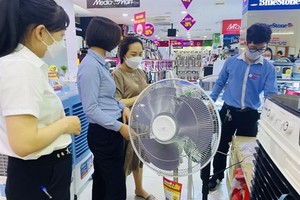
High labor costs, low pepper prices
Although it is in the harvest season, peppercorns have ripened profusely and vigorously and fallen around pepper vines, because of low pepper prices and rising labor costs, many black pepper farming households in Chau Duc District in Ba Ria - Vung Tau have been desperately looking for harvesters. There was a time when up to 90 percent of people in Quang Thanh Commune lived off black pepper. Mr. Pham Van Hai said that more than five years ago, his family had more than 2 hectares (ha) of black pepper. After harvesting and deducting expenses, a profit of a few hundred million was normal. However, in the past few years, the prices of black pepper plunged, so his family has gradually reduced the pepper growing area to only about one-third, and the fertilization and care have been at a moderate level. However, in the harvest season, although he searched everywhere, he only managed to find less than a dozen of workers to pick pepper for VND240,000 per day.
Similarly, after the Tet holiday, the family of Mr. Nguyen Van Man in Binh Gia Commune also desperately found people to harvest 4,000 square meters of pepper. Because his family cut the costs for fertilization and care, the peppercorn yields merely reached about 1.5 tons per 1,000 square meters. But if they did not harvest pepper, the output would be lower and even would have a bad crop next year. Therefore, despite high labor costs, many households still have to find people to harvest pepper to maintain their pepper plantations. With the prices ranging from VND51,000 to VND53,000 per kilogram as currently, pepper farmers find it difficult to make profits. According to the Chairman of Quang Thanh Commune Farmers' Association, in the past two years, from a locality with the largest pepper growing area in Chau Duc District with about 890ha, now there are only about 500ha left. Partly because the pepper vines were old, so farmers cut them off. Meanwhile, other farmers have switched to grow fruit trees, such as Thai jackfruit and durian, or industrial crops, such as cocoa and cashew. According to statistics, Ba Ria - Vung Tau Province currently has about 11,000ha of pepper, and the yield of most pepper plantations has decreased by over 50 percent compared to the previous year.
In Dong Nai Province, Cam My District, which is considered the capital of pepper, with an area of nearly 7,000 hectares, is also in the same situation. Although it is the peak of the harvest, this countryside is not as bustling as in previous crops. Many farmers chopped down pepper plantations to convert to other crops, such as jackfruit and pomelo. In Lam San Commune in Cam My District, there was an area of more than 2,200ha of pepper two years ago. But in this crop, there is only 1,500ha left. Mr. Truong Dinh Ba, Chairman of the Farmers Association of Lam San Commune, said that pepper yield dropped sharply this year. In recent years, pepper prices had been continuously plunging and now have reached the bottom, so many pepper growers feel discouraged and do not want to invest in pepper anymore. Currently, the purchasing price of pepper in Lam San Commune is about VND52,000-VND54,000 per kilogram. At this price, pepper farmers are suffering a loss of VND25,000-VND30,000 per kilogram compared to the production cost. The labor cost for harvesting pepper is about VND230,000-VND240,000 per day, but workers are not available. Amid this situation, many pepper farmers have bought nets and tarps and spread them on the ground to gradually collect fallen peppercorns.
Building a VietGAP standard production chain
Mr. Truong Dinh Ba said that despite the difficulties, many farmers are still sticking with black pepper. They have changed their production habits and switched to organic planting to increase product quality instead of running after productivity. Especially, they have joined in Lam San Export Cooperative. Therefore, this year, despite the impacts of the Covid-19 pandemic, the life of pepper growers participating in Lam San Cooperative remained stable. The cooperative purchased all pepper output of its members at a price higher than or equal to the market price.
Not only ensuring consumption, at the end of the crop, households participating in the cooperative also received a bonus of VND4,000 per kilogram of the amount of pepper that they had sold. According to Mr. Ba, this is a good model that the province needs to invest in maintaining and expanding. Moreover, Mr. Ba is currently joining the organic pepper production club to improve the quality of pepper, aiming at fastidious export markets. Although the organic pepper growing model is under trial, initially, there are positive signs.
Vice-Chairman of the People's Committee of Dong Nai Province Vo Van Phi said that the province currently has a fairly large pepper growing area of 12,000 ha, and pepper is in the group of key crops. In the coming time, the province will support pepper growers to build a production chain from clean production to consumption following the VietGAP standards for export. At the same time, localities and departments need to have practical support policies to help farmers to overcome difficulties and contribute to the sustainable development of pepper plants.
In Ba Ria - Vung Tau Province, with organically-grown seedless pepper, Bau May Agriculture, Trading, and Tourism JSC exported tens of tons of preliminarily processed pepper at the price of VND22 million per kilogram. Besides, the company also creates many products under the Bau May brand name, such as pickled fresh pepper, pickled green pepper, and partially-dried pepper for domestic consumption. According to Mr. Lam Ngoc Nham, Director of the company, the value of deep-processed products increases by about 250 times compared to that of the unprocessed ones. Many foreign partners have visited the company’s pepper plantation and placed orders. Particularly, a Japanese partner signed a contract to buy pepper products from Bau May Cooperative for five years.
























